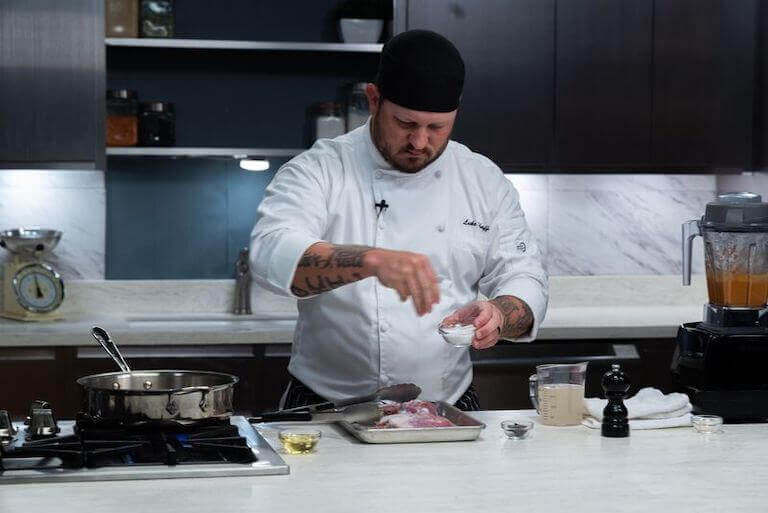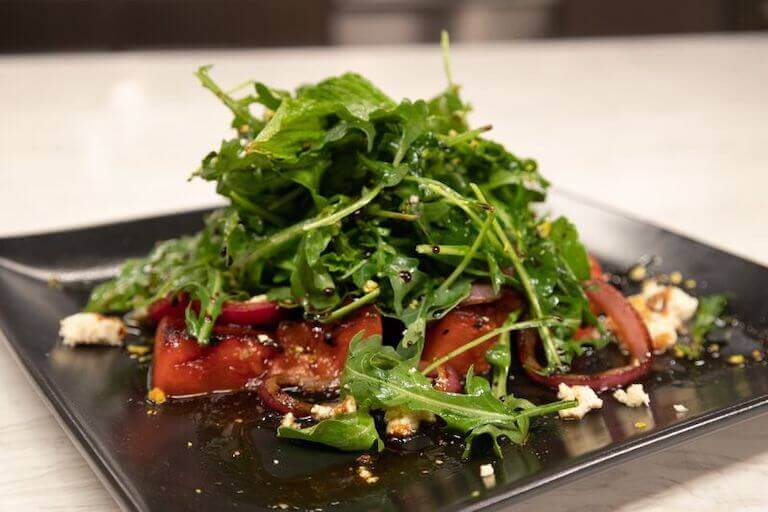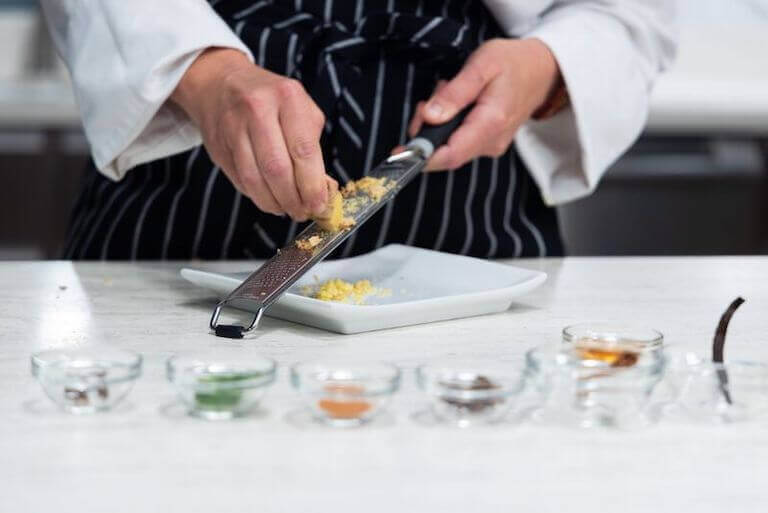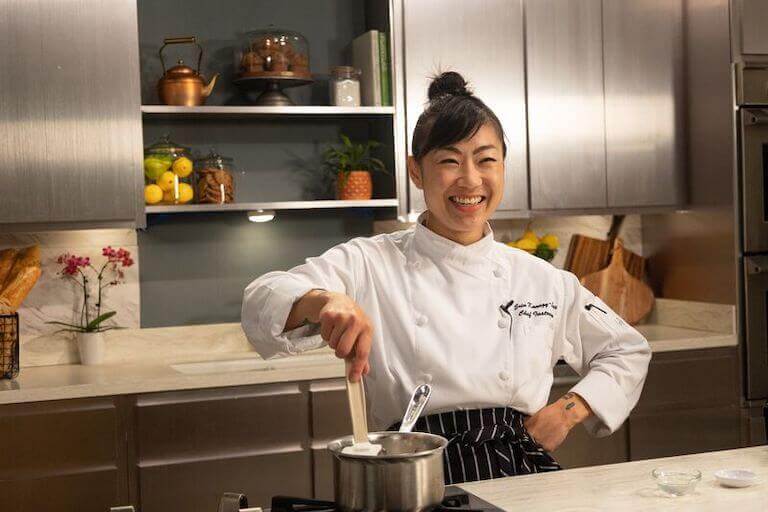Whether you’re coming straight from high school or you already have a bachelor’s degree under your belt, you may find that culinary school is a different proposition than any education you’ve had before.
After all, culinary school is a far cry from the traditional high school classroom or the crowded college lecture hall!
And that means you’re likely to have questions about what exactly to expect.
So before you sign on the dotted line or buy your first pair of houndstooth pants, here’s what you need to know before you commit to culinary school.
Escoffier 101
To learn more about attending Auguste Escoffier School of Culinary Arts, this detailed article dives into our history, programs, and what sets Escoffier apart from other culinary schools:
Escoffier 101: Everything You Need to Know About Culinary School
1. You Should Know…What to Expect From Your Program
It’s culinary school, after all. So you’re going to learn how to cook, right?
Not so fast. We do refer to Escoffier as a “culinary school” but it’s really so much more than that.
Escoffier offers 11 different degree and diploma programs across six different disciplines. So before you enroll in culinary school, you’ll need to choose where you want to focus your attention. Here’s a quick look at the programs you could study at Escoffier.
Culinary Arts
Culinary Arts is what most people think of when they think of “culinary school.” A comprehensive culinary arts program can include coursework in sanitation and food safety, cooking methods and knife skills, and traditional and contemporary techniques. Depending on the program, courses can also help you look at the business side of the food service industry, with education in controlling costs and being a good leader.
Escoffier’s Culinary Arts program may prepare students for a future career as a cook, or a restaurant or food truck owner, or dozens of other careers in food.

An Escoffier Chef Instructor seasoning chicken for Mole Poblano.
Baking & Pastry Arts
If you’re fascinated by the science behind the perfect loaf of bread, or dream of row upon row of identical petit fours, then you may be interested in a Baking & Pastry Arts education. Unlike Culinary Arts, which provides students with the tools to create appetizers, entrees, and breakfasts, Baking & Pastry Arts focuses on baked goods like bread, cookies, cakes, confiserie, and more.
But just like Culinary Arts, some Pastry Arts programs may also include business education to help graduates become stronger employees and managers by exploring topics like food and labor costs and principles of entrepreneurship.
Graduates of these programs might go on to become bakers, cake designers and decorators, chocolatiers, and more.
Plant-Based Culinary Arts
Traditional French cuisine can be heavy on animal products, from the protein in each dish to the generous helpings of butter in the sauces and sautées.
But these days, plant-based eating has become increasingly popular, whether it’s due to health concerns or ethical reasons. Cooking plant-based comes with its own challenges and techniques, which is why Escoffier offers separate Plant-Based Culinary Arts programs.
This education in ingredient substitutions, seasonal ingredients, and plant-based baking can prepare future cooks and chefs for careers in vegan or vegetarian restaurants, catering companies, and as private or personal chefs.

A delightful grilled watermelon dish.
Holistic Nutrition & Wellness
Food is inextricably tied to our health and well-being. So it’s smart to combine a cooking education with principles of nutrition in Escoffier’s Holistic Nutrition & Wellness programs. Students who wish to work as health coaches, holistic nutritionists, or health-food chefs can get the foundational knowledge they may need in nutrition, coaching, and cooking in this online-only program.

Preparing the mise en place for a healthy ginger tea.
Hospitality & Restaurant Operations Management
The foodservice industry does need skilled cooks and chefs. But it also needs educated managers and operators who can bring everything together—the back of house, front of house, and all the little details that make a restaurant, hotel, catering company, or event venue run flawlessly. It’s this kind of training that students can receive in Escoffier’s Hospitality & Restaurant Operations Management program.
With coursework in leadership and service, facilities operations, cost control and purchasing, and human resources, this program can help prepare students for a career as a hospitality manager in establishments ranging from restaurants to hotels to cruise ships.

Restaurant and hotel management is its own unique skill.
Food Entrepreneurship
Escoffier’s newest program in Food Entrepreneurship aims to prepare aspiring culinary business owners for the challenges of running their own operation. Combining coursework in marketing, foodservice management, and the culinary basics, this unique curriculum provides a valuable foundation on which to build a future business.
Degree or Diploma Program?
Within these disciplines, you may have the opportunity to choose either a diploma or a degree program.
At Escoffier, diploma programs have fewer courses and are offered at a lower cost than degree programs. In contrast, associate degree programs include some additional courses, like Technical Writing for the Hospitality Industry or The Science of Nutrition, which both fulfill general education requirements and can help students to become more well-rounded.
2. You Should Know…Where You Want to Study
Making a smart decision about the school you want to attend can have major implications for your future career. Not all culinary schools are the same, so choosing your school is an important step!
What Should You Look For in a Culinary School?
Start with great Chef Instructors. These are the people that you’ll be learning from every day, so your faculty is one of the most important pieces of the school puzzle. Look for instructors with both education and real-world experience. Escoffier’s Chef Instructors include executive chefs, business owners, cookbook authors, and Certified Executive Chefs®…they have more accolades than we can count!

Chef Erin Kanagy-Loux teaches Pastry Arts online.
You should also consider the school itself—is it a community college or a larger university that has dozens of majors? Or is it a school that is obsessed with all things culinary? A dedicated culinary school is less likely to include irrelevant coursework that likely has nothing to do with your goals.
Also consider accreditation. Accreditation shows that a school has met certain standards of education and quality, and it can help protect students from making a poor financial investment. Auguste Escoffier School of Culinary Arts is an accredited institution through a number of national, state, and private authorities.
Where Do You Want to Study?
Many culinary schools are concentrated in some of the most expensive markets in the United States, like New York City. The high cost of relocation could make attending school a difficult proposition.
Escoffier’s campuses are in Austin, Texas and Boulder, Colorado—two food-friendly and much more affordable cities. But if uprooting your life isn’t an option, you can still get your education! With Escoffier’s online culinary school programs, students can get their education in any of our programs from their own homes.
3. You Should Know…What the Enrollment Process Requires
Enrolling in culinary school is a pretty simple process at Escoffier. The best place to start is by filling out an information request form online. Then you can complete an initial interview over the phone to discuss your goals with our Admissions Department.
Next, you’ll fill out an online application form and sign an Enrollment Agreement. You’ll also have to submit some additional documentation, like a photo ID and proof of high school completion or equivalent. This could be a high school diploma, equivalency exam, or state-approved home school certificate of completion.
While you complete this process, you can also work with the Financial Aid department to get your federal aid package if you qualify, and start applying for scholarships.
There are a few additional steps in the process, but this is the basic “how to” for enrolling in culinary school at Escoffier. It’s a simple process, and Escoffier’s Admissions Department is available to help every step of the way.***
4. You Should Know…The Cost of School and How You Can Pay For It
Before you enroll in culinary school—and commit yourself to the financial investment—you should have a clear understanding of the program costs and what resources are available to you.
Some culinary schools can be very costly, possibly putting students into excessive debt before they even get started on their careers. But at Escoffier, programs range from $17,258 to $35,685 for the 2022-2023 academic year.*
“The cost for Escoffier is substantially less compared to the other schools I researched…Escoffier was definitely worth it. You can’t put a price tag on knowledge and education.”*
Brent Unruh, Escoffier Graduate & Executive Chef, Target Hospitality
Once you’ve determined the cost of your program, you’ll have to figure out how to pay for it. At Escoffier, many students qualify for federal financial aid, including loans and grants. These aid packages can make education possible for many students who couldn’t otherwise afford it. Plus, students may be able to secure culinary school scholarships and grants, which don’t have to be paid back.

5. You Should Know…What Kind of Support Your School Offers After Graduation
The weeks or months that you spend in culinary school don’t give you the whole picture of your education experience. What can you expect from your school after graduation day?
A high-quality culinary school can continue to offer resources and support as you progress through your career.
Escoffier’s Career Services team can help graduates with important work skills like resume writing, interviewing, and job searches. Escoffier Connect is Escoffier’s own online employment network, designed to help connect career seekers with available positions at top employers across the country.
“The Alumni Relations team works really closely with Career Services. Students regularly talk with Career Services coaches who are also aware of the opportunities available on the job board…where alumni and employer partners can share information about jobs and externships.”*
Kay Larson, Escoffier Alumni Relations Manager
Graduates are also encouraged to build their professional networks with the Escoffier Alumni Association. This online platform provides a place to connect with other graduates and students from before and after your time in school.
Your Future Starts Here
For future cooks and chefs, bakers, health coaches, and restaurant managers, an education is the place to start.
If you have more questions about culinary school, we’d love to help! Contact us so we can answer all of your questions and help you make a smart decision about enrolling in culinary school.
To learn more about the importance of education for a career in cooking or hospitality, start with these articles:
- How to Train as a Chef
- The Pros and Cons of Vocational School: Is It Right For You?
- Culinary Math & Science: Turning Your High School Education Into a Culinary Career
*Information may not reflect every student’s experience. Results and outcomes may be based on several factors, such as geographical region or previous experience.
**Tuition rates are subject to change. Check Escoffier’s Tuition & Fees page for up-to-date pricing.
***For complete admissions requirements visit our catalog.



